
The men's rings was a gymnastics event contested as part of the Gymnastics at the 1964 Summer Olympics programme at the Tokyo Metropolitan Gymnasium. The event was held on 18, 20, and 22 October. There were 128 competitors from 29 nations, with nations in the team competition having up to 6 gymnasts and other nations entering up to 3 gymnasts. The event was won by Takuji Hayata of Japan, the nation's first victory in the rings after two Games with bronze medals. Silver went to Franco Menichelli of Italy, the nation's first rings medal since 1932. Boris Shakhlin of the Soviet Union took bronze, breaking a three-Games gold medal streak for the Soviets. Shakhlin was the fourth man to win multiple medals in the rings, adding to his 1960 silver.

The men's individual all-around competition was one of eight events for male competitors in artistic gymnastics at the 1972 Summer Olympics in Munich. The qualification and final rounds took place on 27, 29 and 30 August at the Sports Hall. There were 113 competitors from 26 nations. Each nation could send a team of 6 gymnasts or up to 3 individual gymnasts. The event was won by Sawao Kato of Japan, the third man to successfully defend an Olympic title in the event; it was Japan's third consecutive victory in the event. The Japanese gymnasts swept the medals, with Eizo Kenmotsu earning silver and Akinori Nakayama. Kato and Nakayama, who had also taken bronze in 1968, were the eighth and ninth men to win multiple medals overall in the event. It was the first medal sweep in the event since France did it in the first edition in 1900. This broke the Soviet Union's five-Games medal streak, with their best gymnast finishing fourth.

These are the results of the men's vault competition, one of eight events for male competitors in artistic gymnastics at the 1972 Summer Olympics in Munich. The qualification and final rounds took place on August 27, 29 and September 1 at the Olympiahalle. There were 111 competitors from 26 nations ; nations entering the team event had 6 gymnasts while other nations could have up to 3 gymnasts. The event was won by Klaus Köste of East Germany, the nation's first victory in the men's vault. The Soviets took silver and bronze, respectively, from Viktor Klimenko and Nikolai Andrianov respectively.

The men's horizontal bar competition was one of eight events for male competitors in artistic gymnastics at the 1972 Summer Olympics in Munich. The qualification and final rounds took place on August 27, 29 and September 1 at the Olympiahalle. There were 113 competitors from 26 nations; nations entering the team event had 6 gymnasts while other nations could have up to 3 gymnasts. Japan reached the height of its success in the event this year, thoroughly dominating the event by taking the top five places. Mitsuo Tsukahara was the winner, with Sawao Kato second and Shigeru Kasamatsu third. Japan had now won the event in four of the last five Games. The only finalist from outside Japan was Nikolai Andrianov of the Soviet Union.
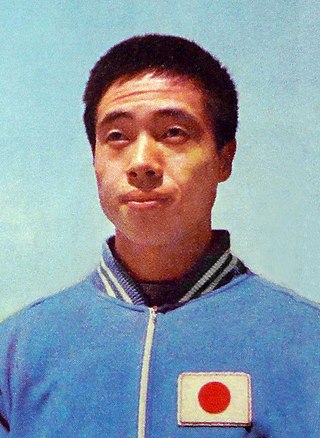
The men's parallel bars competition was one of eight events for male competitors in artistic gymnastics at the 1972 Summer Olympics in Munich. The qualification and final rounds took place on August 27, 29 and September 1 at the Olympiahalle. There were 112 competitors from 26 nations ; nations entering the team event had 6 gymnasts while other nations could have up to 3 gymnasts. Japan reached the height of its success in the event this year: putting four men into the six-man final and sweeping the medals. Sawao Kato earned Japan's third consecutive gold medal in the parallel bars, tying Switzerland for most golds all-time; Kato would break that tie in 1976 with his second gold medal. Shigeru Kasamatsu took silver while Eizo Kenmotsu earned bronze.

These are the results of the men's pommel horse competition, one of eight events for male competitors in artistic gymnastics at the 1972 Summer Olympics in Munich. The qualification and final rounds took place on August 27, 29 and September 1 at the Sports Hall. There were 111 competitors from 26 nations ; nations entering the team event had 6 gymnasts while other nations could have up to 3 gymnasts. The event was won by Viktor Klimenko of the Soviet Union, the nation's fourth victory in the men's pommel horse. Sawao Kato (silver) and Eizo Kenmotsu (bronze) returned Japan to the pommel horse podium after a one-Games absence.

The men's vault competition was one of eight events for male competitors in artistic gymnastics at the 1976 Summer Olympics in Montreal. The qualification and final rounds took place on July 18, 20, and 23rd at the Montreal Forum. There were 90 competitors from 20 nations, with nations competing in the team event having 6 gymnasts while other nations could have up to 3 gymnasts. The event was won by Nikolai Andrianov of the Soviet Union, the nation's fifth gold medal in the men's vault; it was the seventh consecutive Games that the Soviets had a gymnast place in the top two. Andrianov became the third man to win multiple vault medals, adding to his 1972 bronze. Japan returned to the vault podium after a one-Games absence, with Mitsuo Tsukahara taking silver and Hiroshi Kajiyama bronze.

The men's pommel horse competition was one of eight events for male competitors in artistic gymnastics at the 1976 Summer Olympics in Montreal. The qualification and final rounds took place on July 18, 20, and 23rd at the Montreal Forum. There were 90 competitors from 20 nations, with nations competing in the team event having 6 gymnasts while other nations could have up to 3 gymnasts. The event was won by Zoltán Magyar of Hungary, the nation's first victory in the pommel horse since 1932. Eizo Kenmotsu of Japan was the fifth man to win multiple medals in the event, adding a silver to his 1972 bronze. Nikolai Andrianov of the Soviet Union and Michael Nikolay of East Germany tied for third, each receiving bronze medals; this was East Germany's first medal in the event while the Soviet Union stretched its podium streak to seven Games.

The men's parallel bars competition was one of eight events for male competitors in artistic gymnastics at the 1976 Summer Olympics in Montreal. The qualification and final rounds took place on July 18, 20, and 23rd at the Montreal Forum. There were 90 competitors from 20 nations, with nations competing in the team event having 6 gymnasts while other nations could have up to 3 gymnasts. The event was won by Sawao Katō of Japan, the first man to successfully defend an Olympic title in the parallel bars—and, as of the 2016 Games, still the only one to do so. It was the fourth consecutive victory by a Japanese gymnast in the event, breaking a tie with Switzerland for most all-time. Japan was unable to repeat its 1972 medal sweep, as nations were now limited to two finalists each. Nikolai Andrianov of the Soviet Union took silver, while Mitsuo Tsukahara of Japan earned bronze, missing a 1–2 finish for Japan by .025 points.

The men's horizontal bar competition was one of eight events for male competitors in artistic gymnastics at the 1976 Summer Olympics in Montreal. The qualification and final rounds took place on July 18, 20, and 23rd at the Montreal Forum. There were 90 competitors from 20 nations, with nations competing in the team event having 6 gymnasts while other nations could have up to 3 gymnasts. The event was won by Mitsuo Tsukahara of Japan, the second man to successfully defend an Olympic title in the horizontal bar. It was the third consecutive victory by a Japanese gymnast in the event, and fifth in six Games. Japan also took silver, as Eizo Kenmotsu finished second, but was prevented from repeating its 1972 podium sweep by new rules that limited nations to two gymnasts in the final. Tsukuhara and Kenmotsu were the seventh and eighth men to win multiple medals in the horizontal bar. Henri Boerio of France and Eberhard Gienger of West Germany tied for bronze, the first medal for France in the event since 1924 and first horizontal bar medal for West Germany.
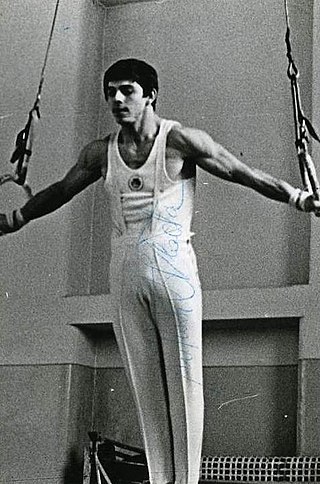
The men's rings competition was one of eight events for male competitors in artistic gymnastics at the 1976 Summer Olympics in Montreal. The qualification and final rounds took place on July 18, 20, and 23rd at the Montreal Forum. There were 90 competitors from 20 nations, with nations competing in the team event having 6 gymnasts while other nations could have up to 3 gymnasts. The event was won by Nikolai Andrianov of the Soviet Union, the nation's first victory in the rings since 1960. Another Soviet gymnast, Alexander Dityatin, took silver. The Soviet podium streak in the event reached seven Games. Dan Grecu earned Romania's first medal in the rings. Japan's three-Games gold medal streak and five-Games podium streak in the event ended as the nation's best results were fifth and sixth places.
The men's individual all-around competition was one of eight events for male competitors in artistic gymnastics at the 1976 Summer Olympics in Montreal. The qualification and final rounds took place on July 18, 20 and 21st at the Montreal Forum. There were 90 competitors from 20 nations. Each nation could send a team of 6 gymnasts or up to 3 individual gymnasts. The event was won by Nikolai Andrianov of the Soviet Union, the nation's fourth victory in the event. It was the Soviets' return to the podium in the event after a one-Games absence in 1972 snapped a five-Games medal streak. Japan, which had swept the medals in 1972, took silver and bronze this time. Two-time defending champion Sawao Kato finished second, becoming the first man to earn three medals in the men's all-around and the most decorated man in the event's history. Mitsuo Tsukahara earned bronze.

The men's parallel bars competition was one of eight events for male competitors in artistic gymnastics at the 1968 Summer Olympics in Mexico City. There were 117 competitors from 28 nations, with nations in the team competition having up to 6 gymnasts and other nations entering up to 3 gymnasts. The event was won by Akinori Nakayama of Japan, the nation's second consecutive victory in the parallel bars event, tying Germany and the Soviet Union for second-most all-time behind Switzerland at three gold medals. It was the second of four straight Games that the parallel bars would be won by a Japanese gymnast. Mikhail Voronin took silver and Viktor Klimenko took bronze to put the Soviet Union back on the podium after a one-Games absence.
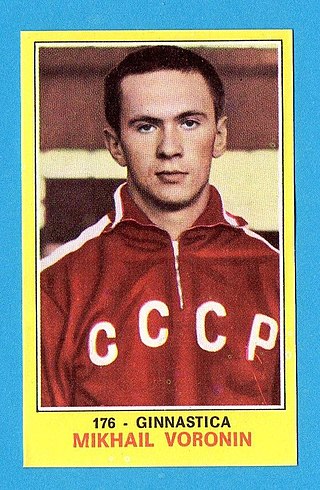
The men's vault competition was one of eight events for male competitors in artistic gymnastics at the 1968 Summer Olympics in Mexico City. The event was held from 22 to 26 October at the Auditorio Nacional. There were 116 competitors from 28 nations, with nations in the team competition having up to 6 gymnasts and other nations entering up to 3 gymnasts. The event was won by Mikhail Voronin of the Soviet Union, the nation's fourth gold medal in the vault. Yukio Endo of Japan took silver, while Soviet Sergei Diomidov earned bronze.
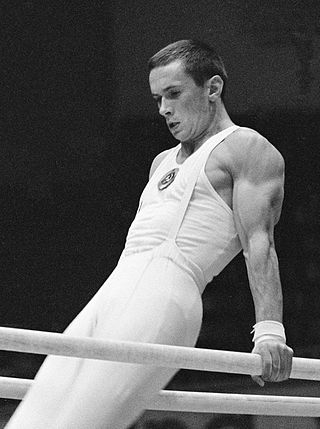
The men's horizontal bar competition was one of eight events for male competitors in artistic gymnastics at the 1968 Summer Olympics in Mexico City. The event was held on 22, 24, and 26 October. There were 115 competitors from 27 nations, with nations in the team competition having up to 6 gymnasts and other nations entering up to 3 gymnasts. The event was won in a tie between Akinori Nakayama of Japan and Mikhail Voronin of the Soviet Union. Eizo Kenmotsu of Japan took bronze.

The men's rings competition was one of eight events for male competitors in artistic gymnastics at the 1968 Summer Olympics in Mexico City. There were 117 competitors from 28 nations, with nations in the team competition having up to 6 gymnasts and other nations entering up to 3 gymnasts. The event was won by Akinori Nakayama of Japan, the nation's second consecutive victory in the rings event. Mikhail Voronin took silver to extend the Soviet Union's podium streak in the event to five Games, while Sawao Kato of Japan finished with bronze.

The men's vault competition was one of eight events for male competitors in artistic gymnastics at the 1960 Summer Olympics in Rome. It was held on 5, 7, and 10 September at the Baths of Caracalla. There were 129 competitors from 28 nations, with nations in the team competition having up to 6 gymnasts and other nations entering up to 2 gymnasts. For the second straight Games, there was a tie for first place in the vault. Boris Shakhlin of the Soviet Union and Takashi Ono of Japan each received a gold medal. It was the third consecutive Games with a gold medal for the Soviets. Ono, who had taken bronze in 1952, became the second man to win multiple vault medals. Third place and the bronze medal went to Soviet Vladimir Portnoi.

The men's individual all-around competition was one of eight events for male competitors in artistic gymnastics at the 1968 Summer Olympics in Mexico City. It was held on 22 and 24 October at the Auditorio Nacional. There were 117 competitors from 28 nations. Each nation entered a team of six gymnasts or up to three individual gymnasts. The event was won by Sawao Kato of Japan, the nation's second consecutive victory in the event. Kato's teammate Akinori Nakayama took bronze. Mikhail Voronin of the Soviet Union took silver. It was the fifth consecutive Games with a Soviet gymnast on the podium in the men's all-around and the fourth consecutive Games with a Japanese gymnast there; no gymnast from any other nation medaled in the men's all-around from 1956 to 1976. In 1960 and 1964, the two nations had taken 8 of the top 10 places both Games, with Yugoslavia's Miroslav Cerar and Italy's Franco Menichelli the only two breaking up the Japanese–Soviet dominance; this time, Menichelli did not finish all exercises and Cerar was the only person from outside the Soviet Union or Japan in the top 10 as those two nations took 9 of the top 10 places in the event.
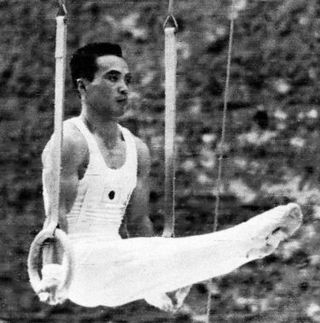
The men's rings competition was one of eight events for male competitors in artistic gymnastics at the 1960 Summer Olympics in Rome. It was held on 5, 7, and 10 September at the Baths of Caracalla. There were 129 competitors from 28 nations, with nations in the team competition having up to 6 gymnasts and other nations entering up to 2 gymnasts. The event was won by Albert Azaryan of the Soviet Union, the first man to successfully defend an Olympic title in the rings. Boris Shakhlin took silver, making it the third consecutive Games the Soviets finished in the top two. Takashi Ono tied with Velik Kapsazov for bronze, giving Japan its second consecutive Games with at least one bronze medal and Bulgaria its first medal in the rings.
The Japan men's national artistic gymnastics team is a sport group governed by Japan Gymnastics Association and represents Japan in international gymnastics competitions and multi-sports events. Followed the establishment of All Japan Gymnastics Federation in 1930, the team first appeared at the 1932 Summer Olympics and gradually became the major force till this day. For nearly two decades, from 1960 to 1978, Japanese men was dominant and won every gold medal at the Olympics and World Championships.















